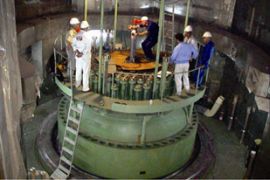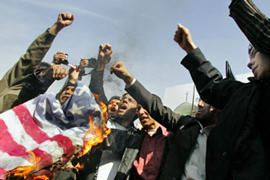Further Iran sanctions challenged
Meeting on Monday to discuss response to Iran’s defiance of UN nuclear deadline.

The Spanish foreign minister was addressing a joint news conference with his Saudi counterpart Saud al-Faisal in Madrid.
Vitaly Churkin, Moscow‘s UN ambassador, said the goal is to reach a political solution, not impose sanctions.
Churkin said: “We should not lose sight of the goal and the goal is not to have a resolution or to impose sanctions. The goal is to accomplish a political outcome of this problem.”
Monday meeting
The meeting in London to discuss more sanctions will be attended by the five permanent members of the Security Council, plus Germany.
| Your Views |
|
“The only way Iran prove it is enriching uranium for peaceful purposes is to allow its nuclear facilities to be inspected by the UN”
Mishmish, Egypt
|
Nicholas Burns, the US undersecretary of state, said he hoped the meeting would quickly produce a draft resolution to “see Iran repudiated again”.
He said it was too soon to say what provisions the resolution might contain.
On Thursday a report from the International Atomic Energy Agency (IAEA) said Iran had ignored a UN deadline to freeze its nuclear programme and instead was moving towards uranium enrichment on an “industrial scale”.
The US says it believes Iran is using its nuclear energy programme as a cover for developing nuclear weapons.
As its steps up diplomatic pressure on Tehran, it has also moved to increase US military forces in the Gulf region with another US aircraft carrier group due in the area shortly.
Commenting on the IAEA report, Burns said Iran was “effectively thumbing its nose at the international community”.
“It’s Iran’s refusal to talk which right now has gotten Iran in a lot of hot water,” he said. “Iran is increasingly isolated, and we hope Iran is going to choose negotiations.”
The US and several EU nations have pushed for more sanctions after Iran defied the UN deadline.
Travel ban
 |
| Iranian students protest in Tehran against growing US pressure [AFP] |
Existing UN sanctions include bans on trade in sensitive nuclear materials with Iran.
New measures under review are thought to include a mandatory travel ban on Iranian officials involved in the nuclear program and an end to government-backed loans and credits.
The measures would also include restrictions on visas to students studying nuclear-related subjects abroad.
Jackie Sanders, a US deputy ambassador at the UN said: “I think it’s clear they [Iran] have ignored the last resolution so it would be obvious to us, at least, that we do need to ratchet up the pressure.”
“Iran needs to see an international community that stays coordinated and showing common purpose to have them stop what they’re doing in developing nuclear weapons.”
Awkward position
|
“Iran is increasingly isolated, and we hope Iran is going to choose negotiations” Nicholas Burns, |
Iran has said it wants to negotiate with the Europeans, led by Germany, and even the US, but has refused to halt its nuclear enrichment program as a precondition for talks.
Tehran contends that its program is for peaceful energy uses only.
Iran’s former president, Akbar Hashemi Rafsanjani says a new UN resolution would be counter-productive:
“The right way is for you (the UN) to give up bullying conditions, abandon the pre-conditions and come to sit with us around the negotiating table,” he said.
After leading Friday prayers in Tehran, Rafsanjani addressed the West directly: “Your most important concern is you do not have confidence that Iran’s nuclear programme is not for military purposes. We are prepared to give guarantees that such a thing will never happen.”
The former president also warned Iranians against using language that could create more problems, that after President Ahmedinejad said on Friday that Iran would serve as a model for countries trying to develop advanced nuclear technology.
Many analysts say Iran remains three to 10 years away from accumulating enough highly-enriched uranium to build an atomic bomb.
Time for diplomacy
Henry Sokolski, executive director of the nonproliferation policy education centre in Washington said: “The Russians and the Chinese have the measure of things.
“Everyone would prefer to have negotiations.”
But he said the International Atomic Energy Agency report “puts the UN Security Council in the awkward position of having to do what it said it would do, which is more sanctions”.
This position was re-iterated on Friday. Speaking on Al Jazeera, Gregory Schulte, the US ambassador to the IAEA said: “The report is very persuasive … Iran has not suspended its activities”.
However he also said that the position remains that there would still be scope for negotiations, if Iran meets the conditions laid down by the UN.
“The good news is that Iran does not have nuclear weapons,” he said, “there is still time for diplomacy”.